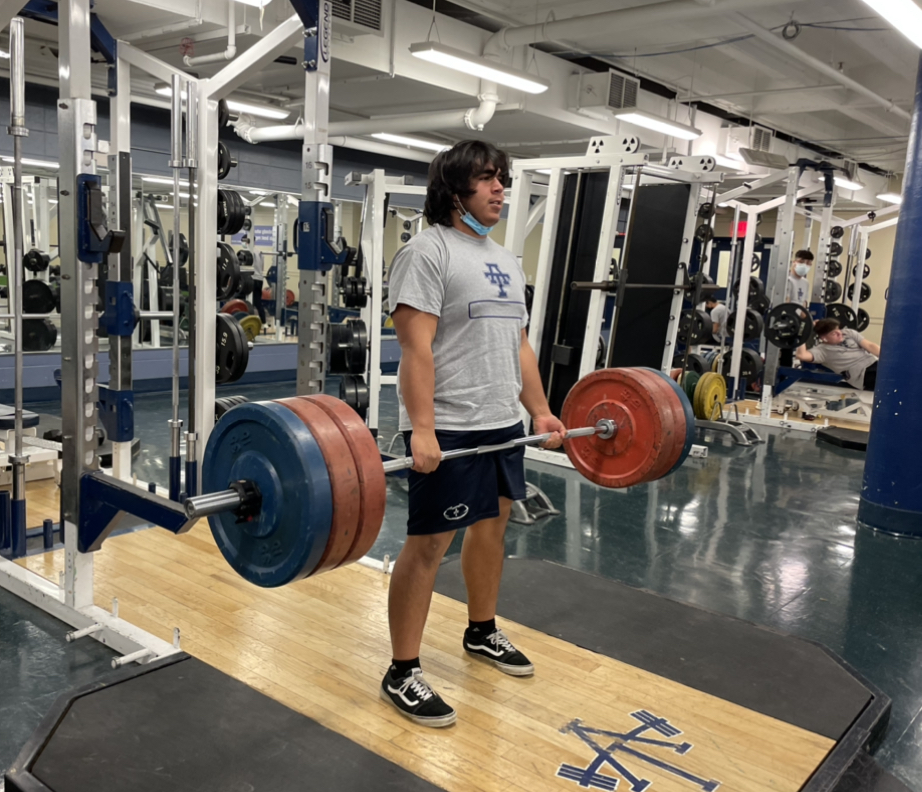It is a well-known fact that student athletes work hard to achieve success in their respective sports, which is why numerous of them would opt to be exempted from PE.
Realistically, students would not intend for a PE teacher to lose their job over the matter, however, a change has to be made.
It is vital that we, as a Blazer community, reach a compromise regarding student athletes and their participation in PE classes.
Even though there is an athlete-specific PE class in the works, it would not sufficiently meet athletes’ requirements because the additional exercise could overwork them. This could potentially lead to injuries and pull students from their sports, especially if that student is more prone to injury. In turn, that may have a negative impact on the student and their team.
Granted, not all student-athletes would want to be exempted from PE.
“If PE was optional for student athletes, I would still take the PE class because I love playing basketball with my friends in PE,” said junior Alex Bucaro.
Despite some student-athletes enjoying the one-to-one connections that PE offers, many may want to opt out of PE. They are exposed to rigorous amounts of physical activity on a daily basis from our respective athletics.
AT offers a wide variety of sports to keep students physically active. No matter what category a sport falls under, students are equally exposed to fitness and important life lessons, including sportsmanship along with leadership. PE was designed to engage students in everyday physical activity, but why should students already involved in sports have to double up on the work?
The state of Illinois requires that students in public schools participate in PE everyday unless a doctor or guardian of the child submits a reasonable excuse. However, there are some exceptions to this code.
According to the Chicago Tribune, “Juniors and seniors also may be excused if they are participating in an interscholastic sport, or if they must use the period for a class they need to graduate or for admission to the college of their choice.”
With that in mind, student athletes technically should not have to be enrolled in a PE class. Of course, high schools have the option if they would like to grant student athletes these exemptions.
Megan Bodett, a junior who attends Lake Zurich High School, explained her school’s policy regarding student athletes and PE classes.
“You can be exempt from PE whenever your sport is in season. For me, I’m pretty much exempt all year round because I’m on the poms team and we have football season, which goes from August to November. Then, we have competition season, which starts November to March,” said Bodett.
Similarly, Monika Urban, a senior who attends Lyons Township High School, states that varsity athletes can be exempted from PE classes. Urban also notes that marching band students can be exempted from a PE class at her high school.
Additionally, senior Jillian Windbiel, who plays volleyball at Conant High School, explains how her school is also lenient on student athletes.
“If you’re a student athlete, you’re required to take PE no matter if you’re in a sport or not. However, if you’re a varsity athlete and you’re struggling with school work and your mental health, you can put in a request through your coach to have a study hall instead of PE,” said Windbiel.
Already, these are three different high schools within the surrounding area that offer some sort of exemption to student athletes.
Windbiel also shared a very intriguing point: mental health. Nowadays, mental health is an issue that plagues high school students. It is not something that we can control and it is not easy fighting our own demons.
While mental health difficulties may not apply to every student athlete, it certainly applies to some. Students’ health should come before anything else. If student athletes’ mental health and stress could be alleviated in the slightest way possible, wouldn’t it be worth doing?
According to whitehouse.gov, “Epidemiological data now show alarming rates of behavioral health needs among school-age youth, with significant increases in the number experiencing moderate to severe anxiety and depression.”
With an increase in mental health needs nationwide, schools should be more cognizant of this predicament. Staff members at AT have also noticed an increase in students struggling with their mental health.
“I’ve been at three different schools the last three school years, and I’ve seen it [mental health struggles] at every single school: Wheaton North, Lake Park High School, and Addison Trail,” said guidance counselor Mario Fernandez. “It’s not unique to our school. I think that’s like the secondary pandemic right now; the deteriorating mental health of kids.”
Additionally, some AT coaches also believe that student athletes should not have to participate in PE classes due to the hard work that they consistently demonstrate on a daily basis.
“If they’re in season, I think that they should do a maintenance thing, but they shouldn’t be with the general population,” said an AT Coach. “If they are in a sport, that sport should take care of their fitness. If they are in a competitive unit that is their sport, I think that they should be exempt.”
Truly, the list is ongoing as to why student athletes should not have to participate in PE classes.
Upon bringing the subject up to Robert Schader, head of the PE department, he reminded the student body that Addison Trail has taken some steps to help out student athletes.
“Well, this is exactly why we put in Online PE, so that kids have an opportunity to still get their exercise while they’re in their sport and still get their grade because it is on the GPA and it is state-mandated as well,” said Schader.
Additionally, Schader further explained why Addison Trail does not offer different options to student athletes regarding an exemption from their PE class.
“I don’t really agree with it [student athletes being exempt from PE], obviously because I teach PE, but the other part of it is that it’s very hard to monitor kids in that situation. It’s only varsity athletes as it is in some schools that do have it, so let’s say you go out for cross country and two weeks later you quit. It’s really hard to get that kid back and get him back into PE because you don’t necessarily know right away, so the chain of command is kind of hard to follow with that. It’s really kind of a sticky situation trying to keep that organized,” said Schader.
Rightfully, that is a fair point. It is completely understandable how monitoring athletes can get dicey, however, many athletes still struggle when it comes to PE.
Some may argue that AT offers Online PE, however, Online PE also comes along with unnecessary stress and it is not always fair to students.
In summary, part of the coursework entails writing journals with the addition of earning 300 MEPs each week. Seems simple right?
Well, not necessarily.
Senior Hugo Arellano relates to the stress that Online PE brings to athletes. Many student athletes are more concerned about representing their school than obtaining MEPs.
“When I am in practice, I am focused on what I need to accomplish and do that day, not getting my MEPs. I understand it’s important to exercise, but I’m already in a sport practicing almost everyday, not just in school but outside of school too. There’s also been days where I have practiced for three hours and not even gotten close to the 300 MEPs mark. There’s definitely a better solution to this somewhere.”
To add on, Online PE is not always inclusive to all sports. For example, obtaining MEPs was difficult for some student athletes because in some circumstances, MEPs could not be recorded.
Senior Michal Niemirski is involved in Boys Swim, and he was incredibly frustrated with Online PE this year. Wearing a heart rate monitor in a pool was something that did not come easy.
“I used to have trouble with obtaining MEPs with the old monitor that went around the chest,” said Niemirski. “It has definitely put me and other swimmers at a serious disadvantage despite exceeding the recommended weekly exercise.”
Niemirski had to push his Online PE teacher to have the school purchase wristbands in order for him to record his MEPs. Niemirski added that he was stressed because he felt like his teacher did not hear his voice until he was ready to instill parental intervention.
Student athletes are already stressed out because they constantly face a lot of pressure. Blazers are not only representing themselves in a sport, they are representing the entire Blazer Nation. An additional stressor, such as PE, should not be added to the mix.
Schader did mention that the school will be getting new and improved heart rate monitors next year. They have been designed to go around the wrist, arm, or chest. Additionally, they have an on and off button. The goal of these monitors is to ease some annoyance that students face when their monitors constantly flicker between on and off.
The current heart rate monitors can be extremely frustrating for many student athletes. While these new heart rate monitors may ease some frustration, it may not necessarily dissolve the stress students face when it comes to PE.
Perhaps Online PE is not the only solution. What if we, as a Blazer Nation, came up with a few alternatives for student athletes?
Student athletes cannot be expected to carry the weight of the school upon their shoulders. They are exceeding the recommended amount of exercise. Why put them through double the work? Why add more unnecessary stress to their daily lives?

